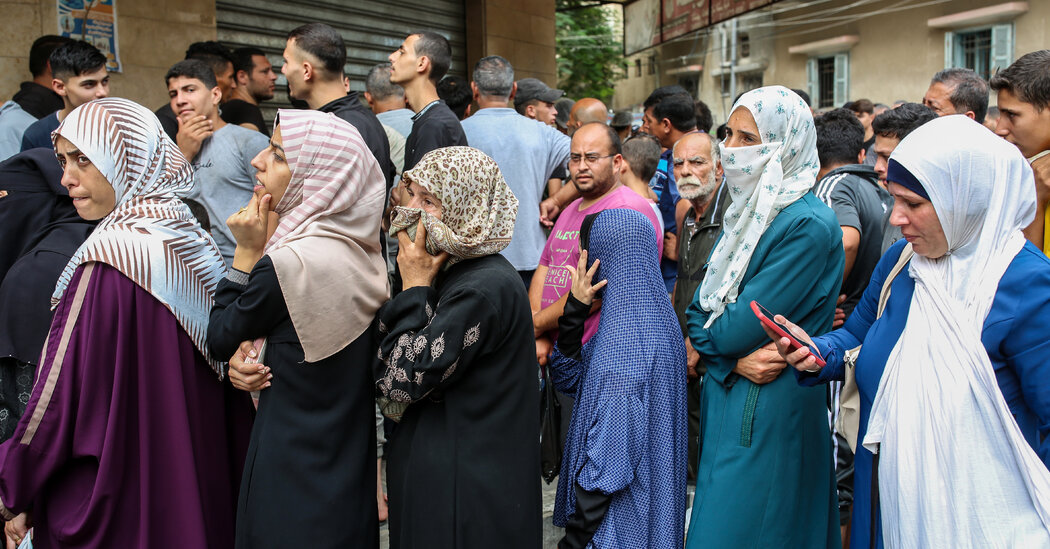Saudi Arabia on Thursday announced a government campaign to collect humanitarian aid for Gaza, gathering more than 60,000 donations worth more than $17 million in its first few hours.
The campaign was announced more than three weeks into the war between Hamas and Israel, which has cut off electricity, water and food for more than two million Palestinians living in Gaza. The effort was begun noticeably later than prior Saudi aid campaigns that were started within days of regional crises — such as the February earthquakes in Turkey and Syria — a delay that appeared consistent with the Saudi government’s somewhat ambivalent response to the conflict.
On one hand, Saudi officials have issued a stream of statements condemning Israel’s bombardment of Gaza, urgently pleading for a cease-fire and calling for the establishment of a Palestinian state. King Salman kicked off the state aid campaign on Thursday with an $8 million donation, while his son, Crown Prince Mohammed bin Salman, donated around $5.3 million, the kingdom announced.
At the same time, many Saudis say they have picked up signals that public displays of pro-Palestinian sentiment are not entirely welcomed by their authoritarian government — especially since the Biden administration revealed this year that it was talking to the Saudi leadership about a potential deal in which the kingdom would establish diplomatic relations with Israel.
This week, a British actor who wore a keffiyeh — a checkered scarf widely viewed as a symbol of Palestinian nationalism — while visiting the holy city of Mecca in Saudi Arabia said that the authorities there had briefly detained him, interrogated him and confiscated the scarf. The Saudi government did not immediately respond to a request for comment on the episode.
The kingdom has not formally designated Hamas, the armed group that rules Gaza and carried out the Oct. 7 attacks in Israel, as a terrorist organization. But in 2019, Saudi authorities detained and prosecuted several Palestinian residents of the kingdom who had connections to Hamas, according to human rights organizations. Saudi authorities appear to implicitly classify Hamas as terrorist group by viewing it as an offshoot of the Muslim Brotherhood, which they designated a terrorist organization in 2014.
Because the government maintains strict controls on charitable giving — originally put in place over counterterrorism concerns — the initial lack of a state-led campaign meant that some Saudis found it difficult to send aid to Gazans, despite a groundswell of popular support for them in the kingdom.
That sentiment was evident on Thursday when the Saudi relief campaign, arranged through the government’s King Salman Humanitarian Aid and Relief Center, collected tens of thousands of donations within a few hours. The head of the center, Abdulaziz Al Rabea, said the campaign was a reflection of “the kingdom’s historic role of standing beside the brotherly Palestinian people throughout various crises,” according to a statement published by the official Saudi Press Agency.
Asked about the timing of the aid campaign, a spokesperson for the center said that the kingdom “has always been at the forefront of aiding Palestinian people” and that the organization has long supported Palestinians through “many projects,” including in partnership with the United Nations.
In contrast, the neighboring United Arab Emirates launched its own humanitarian relief campaign for Gaza on Oct. 13, days after Israel began a siege of the enclave in response to the Hamas attacks. Thousands of volunteers have gathered to assemble aid packages for Gazans, a notable display in a country where public expressions of solidarity with the Palestinians have been muted since the authoritarian government established ties with Israel in 2020.
On Wednesday, the Emirati ruler, Sheikh Mohammed bin Zayed Al Nahyan, ordered officials to arrange medical treatment at Emirati hospitals for 1,000 Palestinian children from Gaza, according to a statement published by the state news agency. Barely any Palestinians have been allowed to leave the blockaded territory since the war began, and the statement did not include details on how the children and their families would be brought there from Gaza. It said only that the Emirates would “provide them with medical treatment prior to their safe return home.”
Ahmed Al Omran contributed reporting from Jeddah, Saudi Arabia.

